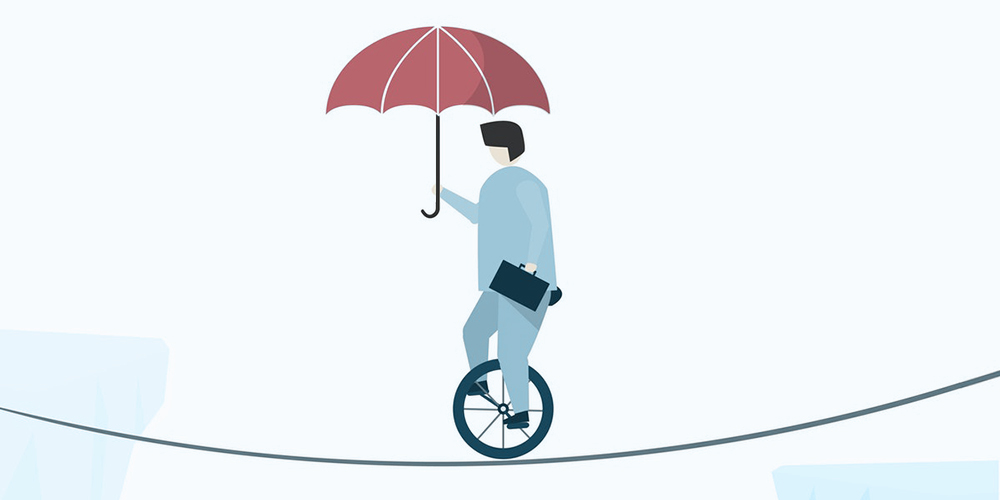Balancing Your WordPress Work with Real-Life Stress

It doesn’t matter what your line of work is: stress is going to affect you at some point or another. Stress is a part of life. And learning how to cope with that is a healthy part of managing your day-to-day existence. This applies to those who work in the WordPress industry as well. Even as you work from home, that flexibility can be wonderful but it steals leaves you open to a variety of stress triggers and work-life balance issues.
What follows is a breakdown of some of the causes of stress and how it affects your body plus a plan of action for learning how to manage stress and work.
Note: We are not doctors and we are not providing medical advice. This article is simply intended to provide information based on our own personal experiences. If you need help, please see a qualified medical professional.
Potential Causes of Stress

Stress can come from many different places. And for many, even day-to-day stressors can be a lot to handle. Figuring out meals. Facilitating school and homework. Achieving work goals. Squeezing in time to exercise. Pursuing hobbies. Spending quality time with a spouse and your kids. It’s all a lot to manage every single day.
That being said, sometimes extraordinary stress bears its weight. A few potential causes of such intense stress include:
- Financial Issues. If you’re working hard and still not able to pay your bills on time, that can cause an inordinate amount of stress. Financial trouble can happen to anyone at some point, so trying to work through that can be a challenge.
- Health issues. If you or someone you love suddenly falls ill, that can make it very hard to meet work obligations. This can cause stress in a couple of ways. Obviously, the health issue is stressful but if you have to take time away from work, that can result in a loss of income, too.
- Child care issues. If your childcare suddenly falls through, you can be stuck between a rock and a hard place trying to figure out how to get your child to school (or homeschool them) all while managing your WordPress workload.
- Loss of a loved one. When a family member or close friend passes away, it can turn your world upside down. Even if you don’t take time off work, your mind will naturally be elsewhere.
- Divorce/relationships ending. Anytime there is relationship strife, it’s bound to cause stress and strain at home and in the workplace.
How Stress Impacts the Body
Besides occupying a large part of your mental capacity, stress can have serious implications for your physical health as well. According to a variety of sources, include the Mayo Clinic, too much stress can result in:
- Anxiety. Feelings of anxiousness can appear when you have too much on your mind or have too much to do. For those who do not struggle with mental health issues typically, anxiety can be a natural result of stressful situations, which can lead to many of the other issues detailed below.
- Insomnia. If anxiety is at its peak, an inability to sleep is a common result. Insomnia can make you feel exhausted during the day when trying to work, which can result in poor work quality, efficiency, and productivity.
- Fatigue. If you’re not sleeping and worried all the time, it’d make sense then that you’d feel tired and fatigued.
- Upset stomach. Stress can cause that nervous feeling to occur in your belly. When you’re stressed for longer than a day or so, it’s common to experience an upset stomach like nausea, gas, and diarrhea.
- Irritability. If you’re stressed and/or fatigued, irritability is often a result. People under intense pressure are often quick to anger.
- Depression. Along with stress and anxiety can come feelings of depression. When you’re under stress, it’s likely you’ll experience some low points where you may feel alone or disinterested in what used to interest you.
- Withdrawal from social situations. Stress can also make you so occupied with the current situation, that you withdraw from social commitments, preferring instead to self-isolate. This can further intensify feelings of depression.
- Substance abuse. In severe cases of stress, some turn to unhealthy habits to ease their worries, including the abuse of drugs and alcohol.
How Stress Impacts Work
Since stress can affect your mind and body in a myriad of ways, it’s understandable how it could impact your work output, too.
Lack of Focus
As stress occupies your mind, it’s likely you’ll find it hard to focus. This can result in a direct impact on your work productivity and output.
Poor Time Management
If your mind is wandering and you’re feeling anxious, it’s likely that hours will pass by without you accomplishing a whole lot. This is frustrating and can work to only compound your stress level. Timekeeping can also become a problem, where workers are late to meetings or forget to properly keep time on projects.
Inability to Make Decisions
As your mind is foggy and you’re feeling tired, decision-making can become next to impossible. What would have been easy decisions regarding site layout or font choice in the past could suddenly become a real challenge.
Damages Relationships
If you’re losing focus, managing time poorly, and struggling with decision-making, it’s only a matter of time before your work relationships will suffer. Submitting incomplete, inaccurate work or submitting late could leave a bad impression with clients and result in a poor business reputation.
How to Maintain Work Commitments in Times of Stress

Pondering all of these factors might make you feel even more stressed. But there is a light at the end of the tunnel. When you’re under intense pressure it’s hard to see the forest for the trees, so to speak. Sometimes taking a step back is all you need to gain perspective about your situation and how you might improve your work relationships in the process.
Here’s a quick guide for managing to keep your bills paid and your WordPress clients happy even while dealing with personal stress.
1. Be Open and Honest
If you’re struggling, it may be wise to let your clients know. While not every client under the sun will be understanding, a lot will be. And they’ll certainly do what they can to help you if you’re upfront about your struggles. No need to go into immense detail but firing off a quick email to say something like, “I’m having a bit of a hard time right now and I’d appreciate your patience,” can work wonders for maintaining working relationships.
2. Set Boundaries (And Keep Them)
Another thing to help improve your work-life balance during times of stress (and all the time, actually) is to set boundaries. Don’t check your email from bed at night or in the morning. Don’t take client calls late at night. Don’t “just check in” on work over the weekend. Holding firm boundaries for “work time” and “me time” can help to reduce burnout and make it easier to meet client obligations.
3. Set a Schedule and Stick to It
Similar to the above, creating a schedule and committing to it means always knowing when you’re set to work and when you’re set to have time for yourself and your family. This makes it easier to prioritize, plan, and otherwise be productive. If your work schedule drags on and on or leaves you no room for personal time, you’re poised to burn out or create a situation where any stress you have is compounded. Use a productivity tool like Trello, or create an editorial calendar if it helps.
4. Schedule Time Off, Too
While it’s vital to know when you’re working and when you’ll have time off over the course of a standard week, you need to think bigger than that, too. Having a clear idea of when your next vacation will be can help ease stress and make you feel less like you’re stuck in a rut. Even if it’s just to take a week off at home, that scheduled, planned time away from work can do wonders for your stress level and help to improve your relationships with family and friends, too.
5. Develop Healthy Coping Mechanisms
Stress is an overwhelming feeling. And all too often, people reach for unhealthy ways to cope. Overeating, consuming too much alcohol, smoking, or engaging in other risky behavior are all ways some people deal with stress. Instead, it’s a good idea to develop a plan of action when you’re not experiencing stress to lean on when you hit another low moment. These coping mechanisms could include things like meditation, taking a walk, exercising, meal planning, or taking a mental health day.
If your stress progresses into anxiety and depression for any extended period of time, it’s a good idea to consult with a therapist about your feelings to develop a more rigorous plan of action.

If you’re not sure where to look for help, great online source for support is Big Orange Heart. You can visit their website and talk to a trained professional anytime, anywhere. They also offer a number of helpful webinars, workshops, and resources that you can access from home. Best of all, it’s completely free.
Find What Works for Your Personal and Work Life
Stress can be insidious and infiltrate every aspect of your life. And when it affects your work performance, that can become yet another point of contention. However, with the right toolset and coping strategies in hand, you can work through life’s stresses and maintain your workload, too. It’s about balance, perspective, and honestly, just being kind to yourself. A lot of us in digital spaces tend to take being workaholics as badges of honor and that’s just how it should be.
Prioritize your mental and physical wellbeing, keep your clients abreast of the situation, and you should be good to go.


